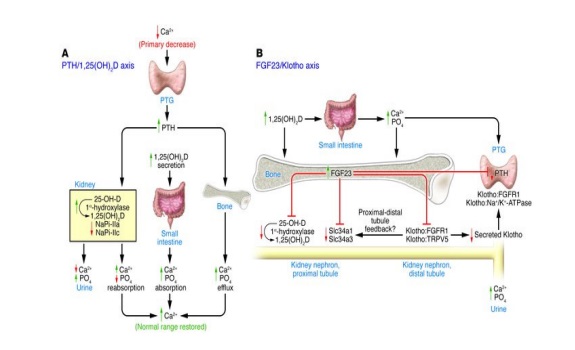BREAKING COVID-19 NEWS! Study Shows That COVID-19 Causes Changes In Phosphocalcium Metabolism!
COVID-19 News - COVID-19 Causes Changes In Phosphocalcium Metabolism Jul 22, 2023 1 year, 8 months, 4 weeks, 1 day, 6 hours, 50 minutes ago
Many Post COVID Individuals will suffer from phosphocalcium metabolism disorders including hypophosphatemia, hypocalcemia, and secondary hypoparathyroidism.
COVID-19 News: The COVID-19 pandemic has not only affected the respiratory system but has also shown to have far-reaching systemic effects. A fascinating new study conducted by researchers from various esteemed institutions in Romania, including 'Dunarea de Jos' University and 'Sf. Apostol Andrei' Clinical Emergency County Hospital, delves into the lesser-known implications of COVID-19 on phosphocalcium metabolism. The findings are nothing short of remarkable, shedding light on the significant disruptions in phosphorus and calcium balance in individuals recovering from COVID-19.
 The maintenance of calcium-phosphate balance is controlled by the parathyroid glands, bone, kidneys, and intestinal tract.
The maintenance of calcium-phosphate balance is controlled by the parathyroid glands, bone, kidneys, and intestinal tract.
Phosphocalcium metabolism is a vital process responsible for maintaining the equilibrium of phosphorus and calcium in the body, which plays a crucial role in various physiological functions, including bone health, muscle function, nerve transmission, and cellular signaling. The study reveals that COVID-19 can lead to a spectrum of phosphocalcium metabolism disorders, including hypophosphatemia, hypocalcemia, and secondary hypoparathyroidism, all of which can have profound consequences on an individual's well-being.
The research team conducted an extensive review of existing literature to explore the impact of COVID-19 on phosphorus, calcium, and parathyroid hormone levels. Their analysis showed a high prevalence of phosphocalcium metabolism disturbances among COVID-19 patients, particularly those with severe cases of the disease.
Interestingly, they found a strong correlation between the severity of these disorders and the clinical manifestations of COVID-19, suggesting that monitoring phosphocalcium levels could serve as a reliable biomarker for assessing disease severity and patient outcomes.
The study also sheds light on the potential mechanisms behind these metabolic disturbances. The direct impact of the SARS-CoV-2 virus on organs responsible for maintaining phosphocalcium balance, such as the kidneys and parathyroid glands, is considered one possible mechanism. Additionally, systemic inflammation and immune dysregulation induced by COVID-19 could further disrupt phosphocalcium homeostasis.
The clinical ramifications of disorders related to phosphocalcium metabolism following a COVID-19 infection are of considerable importance. The presence of hypophosphatemia and hypocalcemia may result in various clinical manifestations, such as muscle weakness, fatigue, bone pain, muscle cramps, tingling sensations, and potential cardiac arrhythmias.
COVID-19 induced Phosphocalcium metabolism disorders can also result in a high prevalence of morphometric vertebral fractures (VFs) in patients with COVID-19 as covered in previous studies and
COVID-19 News reports. VFs problems are associated with reduced survival rates, decreased respiratory function, and compromised qua
lity of life in the general population. Hospitalized patients with COVID-19 may experience an elevated risk of fractures due to various concurrent factors. These factors involve advanced age and comorbidities like diabetes, cardiovascular diseases, and hypertension. Also, it has been previously reported that individuals who are hospitalized due to COVID-19 regularly show hypovitaminosis D, a condition that is known to be linked to decreased bone mineral density (BMD) and an elevated risk of fractures. Vertebral fractures (VFs) and reduced bone mineral density (BMD) have been identified as factors that elevate the likelihood of developing pneumonia and hinder respiratory function, resulting in restrictive pulmonary dysfunction within the general population. VFs have been observed to have an impact on the respiratory function of individuals who have survived COVID-19 in the medium term. This influence, in turn, can have a substantial effect on their overall recovery process and may contribute to the occurrence of Long-COVID.
The implications of these findings are significant for healthcare professionals managing post-COVID patients. Detecting and addressing phosphocalcium metabolism disorders in recovering individuals can potentially mitigate long-term complications and improve patient outcomes. The study highlights the importance of systematic monitoring of phosphorus, calcium, and parathyroid hormone concentrations during hospitalization, allowing for timely intervention and personalized treatment strategies.
To fully comprehend the frequency, underlying mechanisms, and medical consequences of these disruptions, the researchers emphasize the need for larger-scale studies with standardized methodologies and extended monitoring periods. Future research endeavors should aim to enhance our understanding of phosphocalcium metabolism disorders after COVID-19 to provide comprehensive care for those affected.
In conclusion, this new study marks a significant step forward in our understanding of the systemic impact of COVID-19. It unravels the complexities of phosphocalcium metabolism disturbances, bringing to light potential avenues for early detection, intervention, and personalized management of these disorders.
The study findings were published on a preprint server and is currently being peer reviewed.
https://www.preprints.org/manuscript/202307.1470/v1
For the latest
COVID-19 News, keep on logging to Thailand Medical News.
